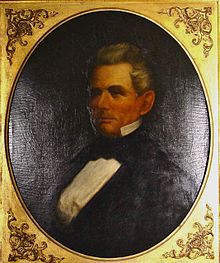Andrew B. Moore
| Andrew B. Moore | |
|---|---|
 |
|
| 16th Governor of Alabama | |
|
In office December 1, 1857 – December 2, 1861 |
|
| Preceded by | John A. Winston |
| Succeeded by | John Gill Shorter |
| Personal details | |
| Born |
Andrew Barry Moore March 7, 1807 Spartanburg, South Carolina |
| Died | April 5, 1873 (aged 66) |
| Political party | Democratic |
Andrew Barry Moore (March 7, 1807 – April 5, 1873) was the 16th Governor of the U.S. state of Alabama from 1857 to 1861, and served as Governor at the outbreak of the American Civil War.
Moore was born in Spartanburg District, South Carolina, to Jane and Charles Moore, a cotton planter and veteran of the American Revolution and the War of 1812. Moore's father purchased land in Perry County, Alabama, in 1823 and moved his family there, although the younger Moore remained in school in South Carolina before joining his family in 1826.
After teaching school at Marion, in Perry County, for two years, Moore read law and was admitted to the bar in 1833. For eight years he served as Justice of the Peace for Perry County.
In 1839 Moore was elected to the Alabama House of Representatives as a Democrat, reelected in 1842, and thereafter served four consecutive terms. Elected Speaker of the House in 1843, 1844, and 1845, Moore worked closely with Governor Benjamin Fitzpatrick in the liquidation of the State Bank. Moore advocated the relocation of the state capitol to Montgomery and delivered the last speech in the old Hall of the House of Representatives in Tuscaloosa.
Moore resumed his law practice in 1846. He was a presidential elector for Democratic candidate Lewis Cass in 1848. Appointed by Governor Henry W. Collier in 1851 to fill a vacancy on the circuit bench, Moore served in that capacity until 1857 when he accepted the Democratic Party's nomination for governor. He was elected without opposition.
Education and internal improvements received significant attention during Moore's first term. Construction was completed on the Alabama Insane Hospital at Tuscaloosa and Dr. Peter Bryce was appointed its first superintendent. The Institute for the Deaf and Blind was established at Talladega. The Medical College, a branch of the University of Alabama, was established at Mobile. Moore advocated state aid supplemented by Federal land grants to promote railroad construction, and he particularly favored efforts of the Alabama and Alabama River Railroad to connect the northern and southern areas of the state.
...
Wikipedia
